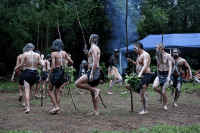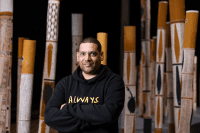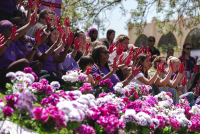Charles Maimarosia is a quiet man in person. Well-dressed, with a large smile, he maintains a low profile during our conversation, keeping his sentences short and to the point. Unlike some other musicians, Mr. Maimarosia doesn’t need to speak much; he lets his array of wonderful instruments do the talking.Charles Maimarosia: Bridging Tradition and Modernity Through Music
A Musical Heritage
Hailing from the remote village of Pipisu, in Malaita in the Solomon Islands, Mr. Maimarosia was raised in a musical environment. His mother, one of the first graduates from college in the Solomons, sang the loudest at church.
“My mum was a very religious person. I remember we went to the church one day, and she used to sing louder than everyone else. I said to her, ‘Mum, do you think God has a hearing impairment?’” he recalls with a smile.
Growing up surrounded by lagoons and mountains, with the sounds of seagulls and waves, Maimarosia always loved music. His unique blend of modern and traditional styles, which tells the stories of his important custom knowledge, has won rave reviews.
From Pipisu to Naarm
“My Culture, My Life,” from his debut album Naratana Hion, hit number one on the Asia/Pacific charts. Having relocated to Naarm (Melbourne) in 2010 to focus on his solo career, Maimarosia has toured with George Telek and released a debut solo EP, Are’Are, in 2016.
His 2020 single, “A’mamiuru,” was released to raise funds for his home community after the devastating ferry disaster caused by Tropical Cyclone Harold. His latest single, “Haiamasina,” is an expansive love poem that illustrates ‘Are’Are customs and traditions.
Having performed in Honiara as part of the Australian High Commission/Wantok Musik Concerts, Maimarosia was the recipient of the MAV Diaspora Award at the Music Victoria Ceremony this year.
Blending the Past and Present
“Blending traditional with modern music — it’s very important. Especially when you want to bring music from the past into the present,” Maimarosia said.
His sound, which encompasses elements of pop, folk, and world music, is simultaneously upbeat and sorrowful. His skilful guitar work is underpinned by traditional instruments, including the Auu rerepi (traditional bamboo pan pipe) and Auu waa (metal pan pipe), complemented by, at times, melancholic vocals.
The Story of Auu Waa
Maimarosia shares the story of the Auu waa, an instrument created to ward off thieves from another tribe. Placed in front of people’s noses when they slept, the instrument would produce sounds from natural breathing and snores.
“If you have five people doing that, it’s like five people having [a] conversation. So, at night, when the thief comes close to the house…they say, ‘oh no, these people are still waking up, they are not sleeping because they are whispering to each other,’” Maimarosia explains.
Preserving Traditional Music
Talking about traditional music, which has made his name, Maimarosia is adamant about preserving its context. “You really have to be careful about the context. Never change a lyric that was made in the past; that was a different era,” he said.
Modern music, with its ability to bring life to traditional music and poems, plays a crucial role in this preservation. “Each song in the past has a story,” Maimarosia said. “It’s good for the present to remember the heritage of wherever that song comes from.”
Connecting Past and Present
For Maimarosia, music is a connection between past and present, helping to revive forgotten words and wisdom. “And it is part of the heritage, part of the culture. And the biggest connection with the present generation is to connect with what the past created; what great grandfathers did – their work of creativity. Whether it is to dance, or songs or storytelling.”
Like other First Nations people, storytelling on Malaita was done orally, with one story even lasting as long as eight days. Elders would pass these stories to younger generations. If the elder dies without sharing the oral history, the story dies with them.
“In our case…you have a lot of people sitting with the storage of songs and things I’ve learned. And it takes someone to go and do some research, talking to elders to get these things,” Maimarosia said.
Upcoming Performance
Charles Maimarosia will be performing at the Melbourne Recital Centre as part of their Intimate Salon Experience on Saturday, 18th of May. This performance promises to be a unique opportunity to experience his masterful blend of traditional and modern music, bringing the rich cultural heritage of the Solomon Islands to a broader audience.
The National Indigenous Cultural Centre (NICC) is an Indigenous home.
We provide Indigenous products, music, art and news.
If you want Indigenous gifts and merchandise, bush tucker food at your next event or Indigenous entertainment at your next party, expo or conference, feel free to contact us!
Visit our page: https://nicc.org.au/
Tony Clemenger.
Chief Executive Officer.
Tel: 0419431649.
Level 1 397 Chapel Street South Yarra 3141.








